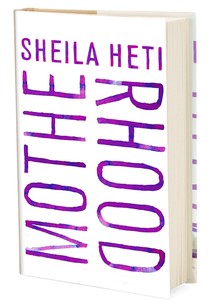A provocative work probes the new norms of femininity.
We live in fast and loose times, when everything from the
relevance of gender to the possibility of truth itself is open to question and
literary genres exist only to be subverted or fractured. Enter Sheila Heti,
whose last novel,
How Should a Person Be?,
became a sensation in part because it moved deftly between so-called reality
and its parsing, with transcribed conversations and emails and chunks of
fiction dropped here and there. Similarly,
Motherhood, billed as a novel, reads like the most compelling (and free-associative) of memoirs—or,
more precisely, like an exemplar of "autofiction" (fictionalized
autobiography), a form whose practitioners include Karl Ove Knausgaard and Ben
Lerner.
Motherhood is a meditation on the
imperatives and costs of becoming—or not becoming—a mother
by a writer who, during the three years it takes her to complete this book,
hears her biological clock begin to tick. The nameless 36-year-old narrator
lives in Toronto with her partner, Miles, a criminal defense lawyer who's
fathered a child with someone else and is not particularly interested in having
another, although he's not opposed, either. His indecision leaves the narrator
feeling all the more at sea: "The question of a child is a bug in the
brain...that crawls across everything."
Heti punctuates her account with a variation on the I Ching
technique of flipping three coins, in which she asks and answers questions ("Is
this book a good idea? / yes / Is the time to start it now? / yes"). Along
the way, we discover a lot about her: She grew up with a distant, depressed
mother whose pain she believes she has inherited; at 21, she had an abortion
about which she feels "vague guilt." Heti's persona is, in short, a
complicated and very modern creature whose musings on creativity ("We
think mainly of our work, to solve the problem of our mothers' tears") and
the pressure to procreate ("A woman must have children because she must be
occupied," she observes sardonically) will speak to mothers and nonmothers
both.
There's a quote attributed alternately to Ralph Waldo
Emerson and Jessamyn West: "Fiction reveals truths that reality obscures."
It is in this truth-seeking sense—and this sense only—that
Heti's latest can properly be called a novel, and a wondrous one at that.


